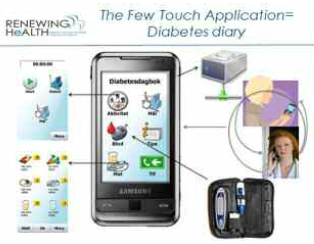By Lis Ribu et al.
The world population has become vulnerable to lifestyle diseases such as Type 2 diabetes. Although new and more efficacious diabetes medications and improved medication delivery systems have been developed, the majority of people with diabetes do not achieve optimal metabolic control, leading to poor health outcomes. Telemedicine services can make healthcare more accessible to people, and can be a useful tool in providing diabetes care and diabetes self-management. Studies, however, are still needed to examine the impact of this technology on patients.
In order to deal with the lack of solid evidence nine European regions, supported by their national governments and with co-funding from the European Commission, have joined forces in the Renewing Health project (www.renewinghealth.eu). The project will implement real-life largescale trials – and recruit about 8,000 patients – to validate and evaluate telehealth services for major chronic diseases including diabetes during 2011 and 2012. It covers 20 pilot programs organized into nine “clusters,” each of them covering a homogeneous type of telehealth service.
The validation and evaluation process is being conducted in the form of a randomized controlled parallel-group unblinded trial. Potential participants are selected by screening electronic healthcare records in the municipality and hospital databases. Randomization is performed separately for each country by specialized departments or research organizations. The objective is to evaluate whether the introduction of large-scale personalized and technology supported telemonitoring and health coaching intervention (in some trials only) produces benefits in terms of clinical outcome, health-related quality of life, health status and empowerment of these patients in managing their health conditions. In addition, all the trials in Renewing Health evaluate the economic and organizational impact of the new services, and examine their acceptability by patients and health professionals.
Six of the 20 trials covered by Renewing Health are dedicated to diabetes. They have been organized into two “clusters,” because of differences in the type of intervention foreseen in the various pilots.
The aim in Cluster 2 “Life-long monitoring” of patients with diabetes is to evaluate whether patients with diabetes mellitus can be followed by simplified, centralized and large-scale telemonitoring of blood glucose levels and blood pressure. It will also assess whether this intervention produces health and economic benefits when introduced without major changes to the existing care process of a large provider of primary healthcare services (Berlin, Germany) or a secondary care center (Trikala, Central Greece).
Cluster 1 – “medium-term health coaching and lifelong monitoring” – is made up of four pilot sites. In Norrbotten, Sweden, participants receive PCs with dedicated software that manages the collection and transmission of their diagnostic measurements. Measurements are performed on a regular basis by the participants, and equipment will be installed in participant’s homes. The participants can review all their measurements in a graphical display. The telemedicine application will be integrated with the local Health Information System.
The intervention in South Karelia, Finland, consists of regular measurements of physiological and health parameters. Participants receive equipment and a mobile phone with specific software for manual and/or automatic reporting of data to a central server. Measurements are taken regularly on a personalized basis, and are entered in personal health records via a Web application. In addition, the self-management server will send participants feedback and reminders on the basis of the reported health parameters and in compliance with the self-management plan.
In Northern Norway the patients will receive a smart phone with a diabetes diary application (the “Few-Touch Application”), a self-help tool that consists of five main elements that are accessible to the user (food habits registration, blood glucose data management system, physical activity registration, personal goals setting and general information). Patients are requested to self-monitor their blood glucose levels, eating behavior and physical activities on a daily basis, but at intervals that they feel are beneficial and manageable. While blood glucose data is automatically transferred to the phone from the blood glucose meter, activity data and food habits have to be manually entered by the user.
In Carinthia, Austria the intervention aims to ensure a close monitoring of participants’ vital parameters and lifestyle habits in addition to a better fine-tuning of the medical therapy and regular treatment reminders. The monitoring occurs through the integration into and the adoption of the existing Health Information System with dedicated Web portals or smartphones for the participants. Diagnostic equipment is provided at the patient’s home. Measurements can also be collected and transmitted through nursing staff.
In all these pilots, a personal health coach or health coaching team motivates and empowers the participants to reach recommended lifestyle changes with theory- based health counseling.
The results of these trials will be published during the last quarter of 2012, and information will be released on a regular basis at www.renewinghealth.eu.
Lis Ribu Oslo University College Norway
Marc Lange EHTEL Belgium
George E. Dafoulas, M.D. e-trikala SA Greece
Eirik Årsand Norwegian Centre for Integrated Care and Telemedicine Norway Lis.Ribu@su.hio.no
About Brenda Wiederhold
President of Virtual Reality Medical Institute (VRMI) in Brussels, Belgium.
Executive VP Virtual Reality Medical Center (VRMC), based in San Diego and Los Angeles, California.
CEO of Interactive Media Institute a 501c3 non-profit
Clinical Instructor in Department of Psychiatry at UCSD
Founder of CyberPsychology, CyberTherapy, & Social Networking Conference
Visiting Professor at Catholic University Milan.










